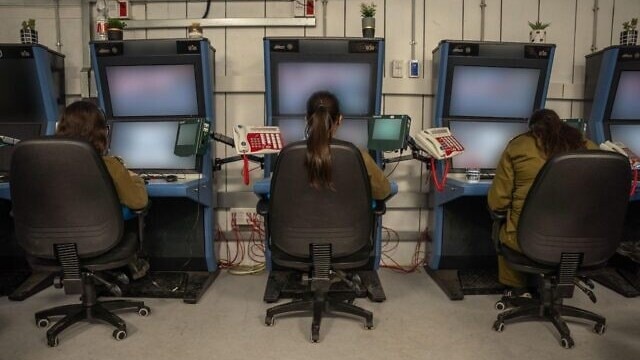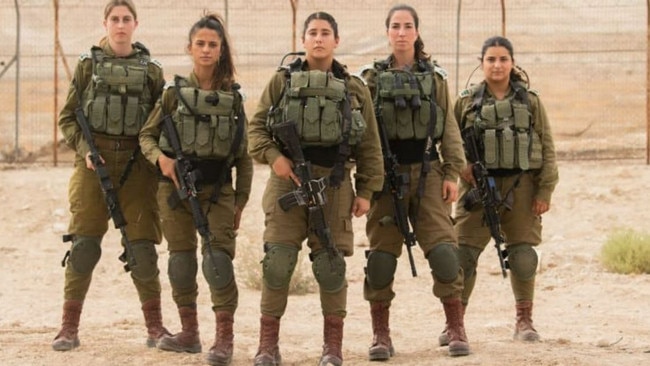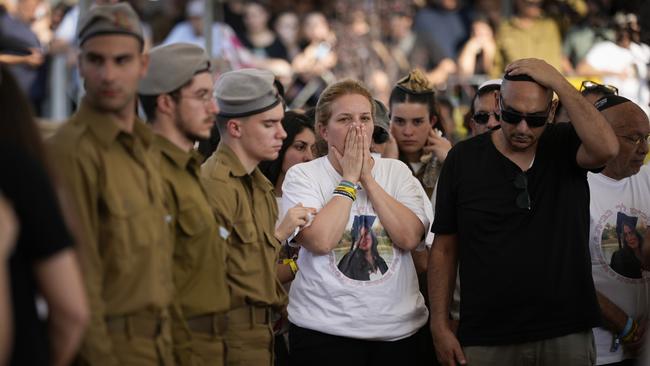Women fear border duty as ‘sitting ducks’ awaiting next attack
Some new recruits have refused to serve as observer soldiers after women were killed and kidnapped at the Gaza border army bases on October 7.

They watch, armed with nothing but a telephone, knowing that if there is an attack, they will be the first to fall. They are all too aware they are filling the shoes of their predecessors, dead or disappeared into Gaza.
Some recruits have refused to serve as observer soldiers, risking jail for desertion rather than join the hundreds who work and sleep in female-only barracks for 12-hour shifts guarding Israel’s borders from Hamas.
“It’s so scary, what happened to them could happen to me,” said Romi Fisher, who received a call-up to a recruitment centre in central Israel this week. She said she would decide at the last minute whether to get on the bus to the army base. “We are all afraid – none of us really want to do this,” she told Israeli television.

At least 15 female soldiers were killed at border bases on October 7, with six others kidnapped and held hostage by Hamas and other militant groups in Gaza, including Liri Albag, 18, who was working her third shift as an observer soldier when she was taken.
Their release is still being negotiated but their families do not know if, after six months in captivity, they are dead or alive. On Tuesday night Prime Minister Benjamin Netanyahu addressed recruits in Tel HaShomer, promising to bring the hostages home. “All of us together, all the soldiers, not just the female observers,” he told a hall of young, worried faces.
On an Israeli military base just a stone’s throw from Gaza’s northernmost beach, 90 recruits from before and after October 7 sit in poker machine-like stations with a control stick to zoom in on their section of the border fence. Known as the “eyes of the military”, they must not look away from the screen, even for a second. Soldiers spend months learning every detail of the sectors under their charge.

“On the 7th, four of our cameras in the field stopped working, and then all the electricity on the base went down, and then our phones didn’t work,” said Isabela, who was there when six Hamas frogmen came out of their boats and on to Israeli land.
“The girls all went into the command centre and locked the door. We were told not to open under any circumstances.”
It wasn’t only the real-time intelligence that didn’t reach the higher command. For weeks, if not months, observer soldiers had been warning of unusual Hamas activity on the border fence including training to take over an observation post.
“We have a moral, ethical obligation to correct what happened on that day, when we failed to defend this post. To be an observer soldier is one of the most important security roles in the protection of Israel,” Israeli military spokesman Daniel Hagari said.
Women on the Yiftah military base say their protocols have changed since October, including instructions on opening fire.

“We still have our shifts, but everything that I saw, everything that I knew, has basically been deleted,” said Ayala, 20.
“All our manoeuvrability, our perspective, our awareness has changed completely.”
Yuval, 20, who joined the military in late October, said: “I guess anything can happen. But I see the heavy security on the seas, precisely because of what happened. I sleep easily at night. I don’t think it can happen again.”
But parents sending their daughters to the post worry they will still not be listened to. They say their children are sitting ducks, unarmed and positioned unnecessarily close to danger when they could be moved to a command centre further away.
“I hope the army has learnt. We are sending our children to this job with a heavy heart, not wholeheartedly,” said Liat, the mother of a recruit heading to the northern border, where observer soldiers watch out for infiltration by Hezbollah militia from Lebanon.
Eyal Eshel, whose daughter, Roni Eshel, 19, was killed at the Nahal Oz border post, said: “I hope something will change here. It has to change, we can’t see that being repeated, on a different day and a different place.”
The Times



To join the conversation, please log in. Don't have an account? Register
Join the conversation, you are commenting as Logout